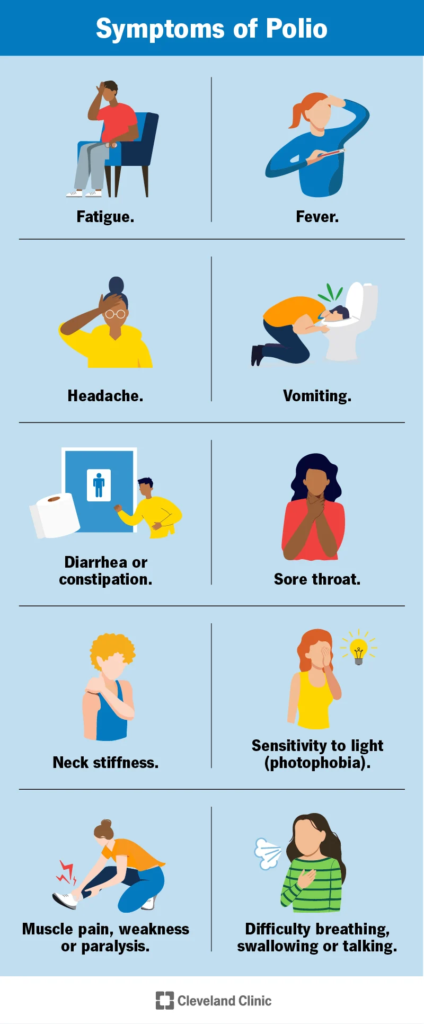Polio, or poliomyelitis, is an infectious disease caused by the poliovirus. It can infect people of any age, but it mainly affects children under 5 years old. However, polio can affect adults too, especially those who have not been vaccinated against the disease.
What Is Polio?
Polio is a contagious viral illness that invades the nervous system and can cause total paralysis in a matter of hours. The poliovirus enters the body through the mouth, usually from hands contaminated with the stool of an infected person. It multiplies inside the intestines and spreads through the bloodstream. As it reproduces, the virus destroys nerve cells that activate muscles (motor neurons). These damaged nerve cells can't stimulate muscles to contract, leading to paralysis.
The most common symptoms of polio include:
- Fever
- Fatigue
- Headache
- Vomiting
- Stiff neck
- Muscle pain
- Limb weakness or paralysis

- Are Non Sorbate Prunes Better for You? (Answered)
- Is Diana Marinade Gluten Free?
- Can You Vape Pure VG?
Can Adults Get Polio?
Yes, adults can get polio. However, due to widespread polio vaccination, most adults have immunity against poliovirus, so the risk is low.
Why Are Adults at Lower Risk?
In the United States, polio vaccination began in 1955. The oral polio vaccine (OPV) eliminated the disease in the U.S. by 1979. Later, the inactivated polio vaccine (IPV) was introduced and has been routinely given to children since 2000.
Most American adults received polio vaccination during childhood and have lifelong immunity as a result. Between 80-90% of adults are protected against polio through vaccination. This high level of immunity in the population means the poliovirus has little chance to spread. Therefore, the risk of polio in American adults is extremely small.
However, adults who remain unvaccinated or under-vaccinated against polio continue to be at risk.
Who Is at Risk of Polio as an Adult?
The following adults are at higher risk for polio:
- Those never vaccinated against polio
- Adults vaccinated but never received the full series of doses
- People from countries where polio is still endemic
- Healthcare workers exposed to the virus
- Travelers to polio-affected regions
People in close contact with someone infected with poliovirus have the highest risk of contracting the disease.

Polio Symptoms in Adults
The signs and symptoms of polio in adults are similar to those in children.
Initial symptoms may seem like the flu and last 2-5 days:
- Fever
- Fatigue
- Headache
- Sore throat
- Vomiting
- Stiffness in the neck and back
- Muscle pain and spasms
As the virus progresses, it invades the motor neurons, leading to muscle weakness and paralysis. Paralysis is the most severe symptom of polio. It usually starts in the legs, then spreads to the arms, chest, face, or diaphragm. Temporary or permanent paralysis can occur within hours.
Some adults may develop post-polio syndrome years later, with new muscle weakness, severe fatigue, and joint pain.
- Is Panta Bhat Good for Weight Loss?
- How Does Bacteria Reproduce?
- Does Crying Burn Calories? (A Comprehensive Evaluation)
Polio Treatment in Adults
Unfortunately, there is no cure for polio. Treatment focuses on reducing symptoms and preventing further disability:
- Pain relievers like acetaminophen or ibuprofen can reduce fever, headache, and muscle pain.
- Physical therapy helps prevent muscle atrophy from disuse and maintains joint mobility.
- Assistive devices like leg braces, crutches, or wheelchairs allow mobility if paralysis occurs.
- A ventilator facilitates breathing if chest muscles are affected.
Preventing polio through vaccination remains the best and only way to fully protect against this crippling disease.
Adult Polio Vaccination
The polio vaccine provides safe and effective protection against the poliovirus. The CDC recommends the following polio vaccination for adults:
Unvaccinated Adults
Adults never vaccinated against polio should receive a 3-dose series of the inactivated polio vaccine (IPV):
- First dose: As soon as possible
- Second dose: 1-2 months after the first dose
- Third dose: 6-12 months after the second dose
This 3-dose regimen offers maximum antibody protection against all types of poliovirus.
Previously Vaccinated Adults
Previously vaccinated adults may need a polio booster shot when:
- Traveling to areas with a high risk of polio
- Working in healthcare and directly exposed to the virus
- Living with someone who has a weakened immune system
For adults needing a polio booster, one lifetime booster dose of IPV is recommended.
Pregnant women should receive a dose of IPV if they have not been previously vaccinated. Getting vaccinated protects the mother and passes antibodies to her baby.
Discuss your vaccination history and potential polio exposure risks with your healthcare provider. They can determine if an adult polio booster is appropriate.
- Does Crying Burn Calories? (A Comprehensive Evaluation)
- How to Support the Perineum During Delivery?
- How to Get Metal Shavings Out of Skin?
Polio Precautions for Adults
Along with vaccination, adults can take precautions to prevent polio infection:
- Practice good hygiene like hand washing, safe food handling, and sanitation to avoid the spread of viruses.
- Avoid contact with potentially contaminated objects like tissues, utensils, clothing or bed linens used by a person with polio.
- Get vaccinated before traveling to countries where polio circulates.
- Seek immediate medical care if experiencing sudden limb weakness or paralysis to get rapid diagnosis and treatment.
- Follow public health warnings about polio outbreaks and participate in vaccination campaigns.
Stay alert about polio risks, especially when spending time in communities with lower vaccination rates or traveling abroad. Proper hygiene, vaccination, and promptly seeking medical care can help adults stay protected against polio.
Conclusion
While polio primarily impacts children, adults are also susceptible, especially if they are unvaccinated. Vaccination protects adults by providing immunity to the disabling and potentially fatal poliovirus. Adults should review their vaccination history and get the recommended polio immunizations based on their risk factors. Practicing good hygiene, avoiding contact with contaminated objects, and seeking prompt medical care if symptoms appear are also vital to prevent polio disease or paralysis. Thanks to vaccination, polio has been eliminated in the U.S. However, maintaining high immunity across all age groups is crucial to eradicate polio worldwide.
- How Does Pressure Change As You Descend Down Towards the Deepest Point of the Mariana Trench?
- What Is a Clear Sky in Animal Crossing?
- What Does Slip Slop Slap Mean?
- Is Hert a Vampire?
- How to Connect to IHG WiFi on PS4?
- Can I Use My PS3 Bluetooth Headset on PS4?
- Why Does the Summer Bay Flying a Norwegian Flag?
- How to Tell If Someone Turned Their Location off iPhone?
- Can You Have Cough Drops with Invisalign?
- How Do You Make a Pool Table Laugh?
- How Do I Cancel My Hinge Subscription?
- Do Dapple Gray Horses Turn White?
- How to Make Positrons?